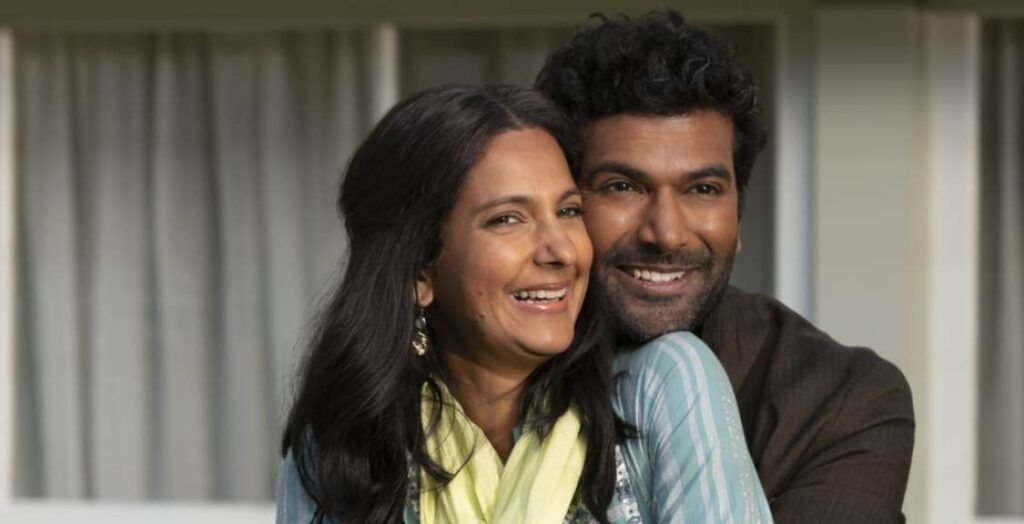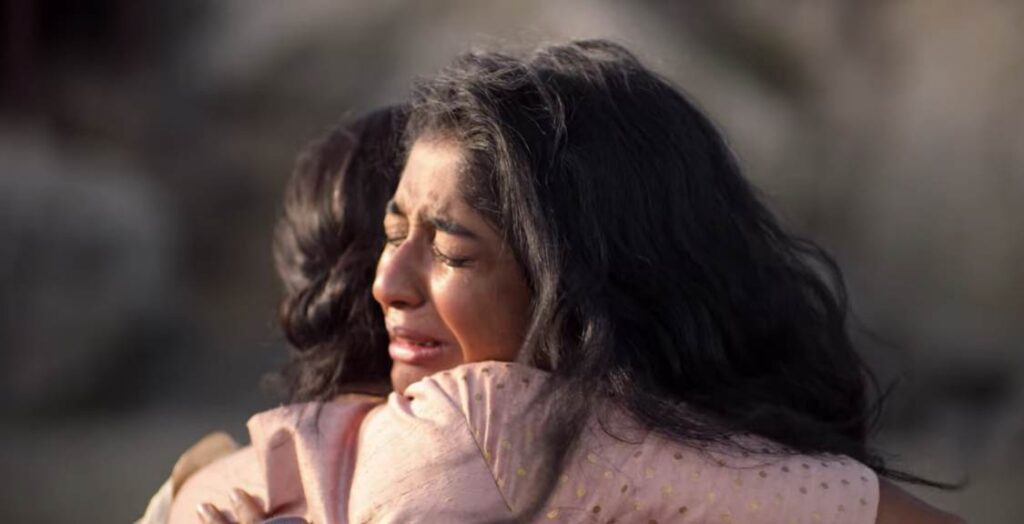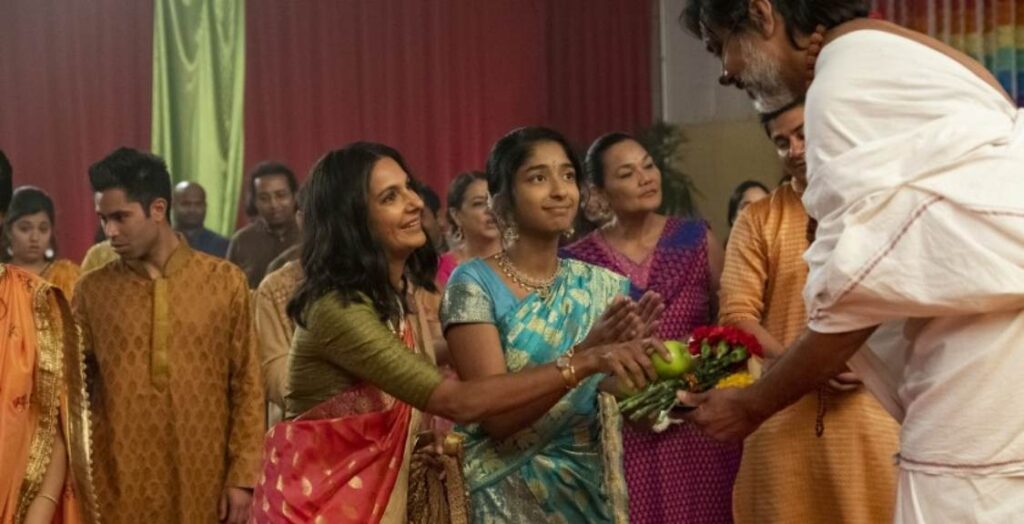Netflix’s new dramedy from Mindy Kaling, Never Have I Ever Season 1 , shows the daily life of its protagonist, Devi Vishwakumar (Maitreyi Ramakrishnan) as she navigates high school life after undergoing the death of her beloved father Mohan (Sendhil Ramamurthy). She is a normal American teenager whose family life represents so much of the immigrant experience. In particular, her relationship with her overbearing and loving mother, Dr. Nalini Vishwakumar (Poorna Jagannathan), highlights the intergenerational conflict that often arises from immigrant parents and their children. In their relationship, we see a raw, emotional, and heartbreaking look at how differences in their independent backgrounds can cause them to hurt each other and how they can reconcile after. It’s an unflinching look at the mental health issues that could arise in immigrant families and is incredibly important to see on screen.
While they are both reeling from the unexpected death of their father and husband, which even causes a brief spout of paralysis in Devi, Devi and Nalini are at odds through most of the series. Devi’s grief is affecting virtually all her interpersonal relationships, causing very high friction with her mother. Nalini keeps encouraging and pushing her daughter to do well at school while laying down strict rules about going out and dating, and sending Devi to a therapist to work through her grief. However, her daughter constantly refuses to delve into the root of her emotional issues, which not only have to do with her grief for her dad but feelings of resentment towards her mom as well. It’s the most important relationship at the heart of the first season that drives the amazing catharsis at the end.
It turns out that there had been friction between the mother and daughter long before what we see in this season. Nalini has always wanted her daughter to be successful and make her family proud, but Mohan was far more of a free spirit who encouraged his daughter to be one as well. He obviously wanted the same success for Devi but pushed her to find her own voice. This would lead to conflict between the much stricter parent and Devi, leading to conflict that Mohan would often mediate.

Right before her husband died, as shown painfully by one of Devi’s repressed memories, Nalini had reached such a point of extreme frustration with Devi, absent-mindedly saying to Mohan, “She’s no daughter of mine!” with Devi overhearing. Clearly, that’s an extremely hurtful and reprehensible thing to say, but it, of course, did not reflect her actual feelings and thoughts for her daughter. Parents, like their children, may have moments of breakdown where they say something they immediately wish they could take back. Now, without her husband’s mediation, Nalini and Devi would butt heads more frequently and more hurtfully with each other. Devi would increasingly put her mother through more grief and frustration with her foolhardy and selfish decisions during the series.
One of the core aspects of the mother-daughter conflict is the cultural differences between them. Devi feeling like she’s not “Indian enough” spoke to me as I often worried growing up that I wasn’t “Kurdish enough” or “American enough.” That was something reinforced to me by family members as it was for Devi. Our identities are not decided by the strict standards of family members. We are enough in who we are, how we were raised, and how we choose to identify based on our backgrounds and upbringings. It’s not even that our parents would ever actually think we were lesser for being more American, but rather that they’d be afraid of us losing core parts that connect us to them and their culture, and thus lose our connection to them. Even though Nalini doesn’t expressly say this, it is very evident in her decisions and actions regarding Devi.
But ultimately Nalini just wants her daughter to be happy and secure, and she doesn’t fully know how to do that in an American setting. She may have lived in this country as a successful doctor for more than 15 years with her husband and daughter, but she still feels like a foreigner, especially after her husband has passed away. They were in this immigrant experience together. Now Nalini feels more alone without her partner, even with Devi and her niece Kamala (Richa Moorjani) living with them. When Devi’s problems keep bubbling up and threaten to erupt, Nalini defaults to deciding that maybe they’d be better off moving back to India, where she has most of her family and support system.
Understandably to Devi, this is an unforgivable action. Clearly Nalini should not be making such a drastic change that would uproot Devi from her home. But behind this misguided mistake is a genuine desire for a secure future for her daughter. It is certainly an incredibly damaging decision that leads to Devi justifiably finding refuge at a friend’s to get away from her mother for a few days, but it was a spur-of-the-moment heartbreaking decision that Nalini felt secure in making. Without Mohan, she felt far less at home here and less confident in bringing up her beloved daughter.
Thankfully, Nalini realizes her short-sightedness after speaking with her daughter’s therapist Dr. Jamie Ryan (Niecy Nash), and that she can’t blame Devi or this country for her daughter’s problems: she has the most important responsibility in making sure that Devi feels secure and confident to tackle life’s hurdles. Her fear of Devi not being ok has driven her to be overprotective, especially as she’s raising her in this still-new environment. Dr. Ryan reminds her that it’s ok to admit that she is also not ok and still struggling with the loss of her husband and the fear it brings, allowing her to have cathartic relief. It’s heartbreaking to see her go through this, just as it is heartbreaking to see Devi deal with her various issues in the series.

Nalini reaches out to and attempts a reconciliation with Devi, asking her to join her and Kamala in spreading her father’s ashes out to sea on his birthday. However, Devi still doesn’t want to say goodbye to her father and rebuffs her. But after getting encouragement from her friends to join her mother and Kamala, Devi joins them and she and Nalini finally apologize to each other. They fully admit that they don’t actually harbor ill to each other and the degree to which Mohan’s death impacted them.
In allowing the immigrant child and parent to be more forthcoming to each other on their mental health, Never Have I Ever Season 1 offered a cathartic encouragement to deal with mental health issues. I feel as though it encouraged me and other immigrant kids to be more forthcoming with our own families on whatever issues we may struggle with. This was a gift to see on screen, especially when good and informed representation of the immigrant experience remains scarce. Even the mere discussion of mental health is often stigmatized in immigrant communities, but on this show, we get to see a brown girl go to therapy regularly. Never Have I Ever Season 1 and other exemplary shows like One Day At A Time tackle mental health in immigrant communities head-on, offering us that representation we are too often denied.
Never Have I Ever Season 1 provides tremendous insight into the emotional and mental health difficulties that immigrant families can face. Nalini and Devi’s relationship is that of a complicated mother and daughter whose immigrant background and strong cultural ties inform their dynamic. While of course, not all immigrant families have the same experience, there was much in here that was relatable for me, and I’m sure many others watching. It was incredibly cathartic to watch, and I’m so thankful I was able to.
You can stream Never Have I Ever Season 1 exclusively on Netflix.







